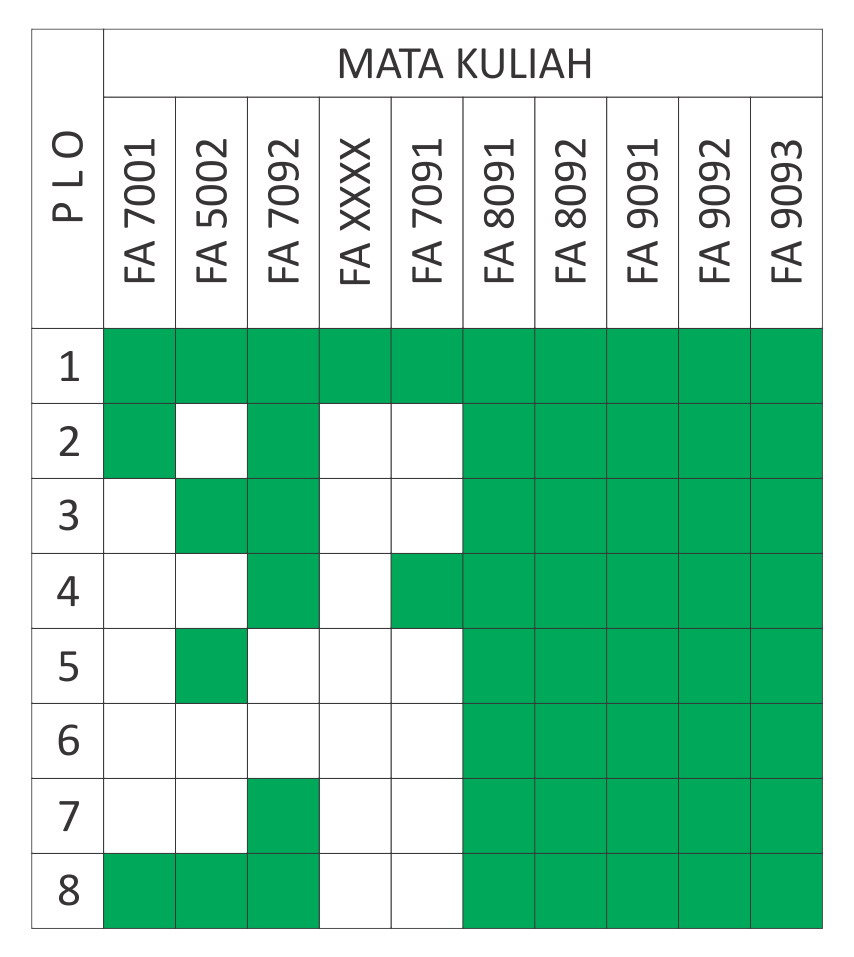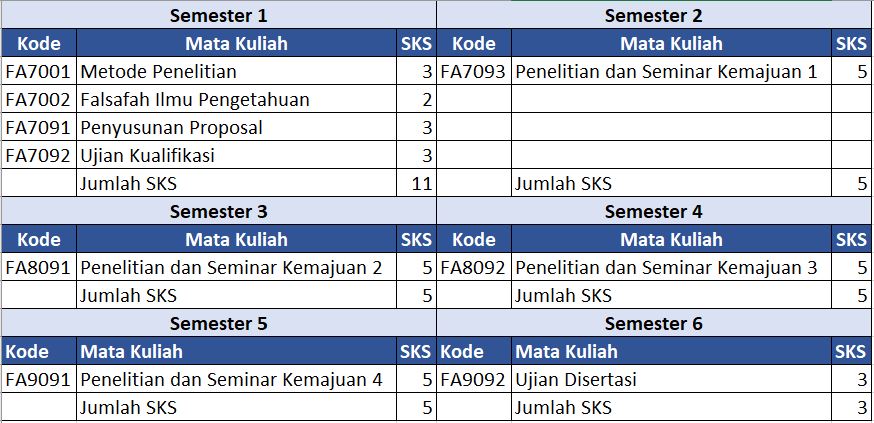Body of Knowledge
Cakupan bidang keilmuan prodi Doktor Farmasi berkaitan erat dengan prodi sarjana Farmasi baik prodi sains dan teknologi farmasi maupun farmasi klinik dan komunitas serta program magisternya. Secara inline keilmuan pada program doktor merupakan pengembangan lebih jauh terhadap keilmuan yang diperoleh pada jenjang sarjana dan magister Farmasi. Body of knowledge program doktor farmasi adalah keilmuan multidisiplin dalam kaitannya dengan obat, kosmetika, produk suplemen kesehatan, alat kesehatan, dan sediaan farmasi lainnya, meliputi ilmu-ilmu terapan yang bersumber dari biologi (hayati/life sciences), kimia, fisika dan ilmu perilaku manusia. Keilmuan dalam bidang kimia obat mulai dari sintesis, analisis dan karakterisasi, penemuan dan pengembangan senyawa baru menjadi cakupan bidang kimia farmasi analisis, analisis & keamanan makanan, dan kimia medisinal. Keilmuan yang terkait dengan farmasetika mencakup teknologi farmasi, biofarmasi, farmakokinetik dan bioteknologi farmasi. Keilmuan yang terkait dengan obat yang berasal dari bahan alam diantaranya bidang fitokimia, standardisasi bahan alam, elusidasi strukstur senyawa bahan alam, dan bioteknologi tumbuhan obat. Keilmuan farmakologi-toksikologi mencakup pengetahuan bidang farmakologi, toksikologi, farmakoterapi, farmasi klinis dan interaksi obat.
Tantangan yang Dihadapi
Era globalisasi mempunyai dampak besar terhadap kehidupan masa depan masyarakat dunia, termasuk Indonesia. Dampak tersebut dapat dirasakan dalam berbagai bidang. Perkembangan obat dan sediaan farmasi lainnya termasuk bidang sangat dipengaruhi oleh dubukanya kran perdagangan yang lebih luas. Kesiapan sumberdaya berkualitas tinggi dengan kompetensi paling atas menurut KKNI merupakan kebutuhan yang tidak bisa dihindari, sehingga menjadi tantangan serius bagi program doktor farmasi dalam menyiapkan sumber daya tersebut sekaligus menghasilkan produk-produk riset yang dapat dimanfaatkan secara luas. Ilmu pengetahuan dan teknologi dalam bidang farmasi serta produk-produk obat dalam rangka meningkatkan kesehatan masyarakat di tingkat global berkembang sangat pesat. Perkembangan tersebut ditandai dengan bertambahnya variasi produk-produk dan pelayanan farmasi. Kecenderungan peningkatan riset dan pengembangan di Industri Farmasi di dunia dan beberapa industri farmasi di Indonesia akan berdampak pada segmen luas yang terkait manufaktur serta memberikan pesan jelas pada perguruan tinggi yang menyelenggarakan pendidikan dan penelitian untuk secara serius meningkatkan kualitas pendidikan dan penelitian yang dapat menjawab berbagai permasaalahan yang ada di semua stakeholder terkait. Pengembangan obat yang sudah ada serta penemuan obat baru telah menunjukkan bahwa pengetahuan saintifik bernilai fundamental dalam pencapaian penemuan dan pengembangan obat tersebut. Sampai saat ini penelitian di Universitas sedikit sekali yang berkaitan dengan riset dan pengembangan di dunia industri. Fenomena ini akan menjadi tantangan bagi Sekolah Farmasi ITB untuk bersama-sama stakeholder berupaya untuk mengembangkan berbagai solusi untuk mengatasi permasalahan terkait obat dan kesehatan melalui kegiatan riset. Kebutuhan industri farmasi untuk sumberdaya manusia yang berkualitas meningkat tajam, terutama yang berkaitan dengan sains dan teknologi farmasi. Riset yang dilakukan pada program doktor farmasi yang sebagian besar masa studinya digunakan untuk riset, mempunyai peran besar dalam pengembangan berbagai aspek terkait dengan obat dan sediaan farmasi lainnya.
Akreditasi atau Standar Kurikulum Acuan
Akreditasi akan diajukan ke Badan Akreditasi Nasional (BAN) yang merupakan lembaga akreditasi nasional di Indonesia
- Renstra Sekolah Farmasi ITB 2011-2015
- Peraturan Pemerintah Nomor 66 Tahun 2010 tentang Perubahan Atas PP No. 17 Tahun 2010 tentang Pengelolaan dan Penyelenggaraan Pendidikan.
- Pedoman Penyusunan Kurikulum ITB 2013-2018 Tahun 2012.
- Sekolah Farmasi ITB, Workshop Evaluasi Kurikulum 2012, Desember 2011, SF, Bandung
- Sekolah Farmasi ITB, Workshop Penyusunan Kurikulum 2013, Desember 2012, SF, Bandung
- Senat Akademik ITB, Keputusan Senat Akademik ITB Nomor : XX/SK/K01-SA/2012, tentang ”PEDOMAN KURIKULUM 2013”.
- Accreditation Council for Pharmacy Education,2007, Accreditation Standards for Continuing Pharmacy Education, Accreditation Council for Pharmacy Education, Chicago, Illinois.
Referensi
- Perpres no. 8 Tahun 2012 tentang Kerangka Kualifikasi Nasional Indonesia
- Undang-Undang Republik Indonesia Nomor 36 Tahun 2009 tentang Kesehatan.
- Undang-UndangRepublik Indonesia Nomor 12 Tahun 2012 Tentang Pendidikan Tinggi
- Peraturan Pemerintah Nomor 51 Tahun 2009 tentang Pekerjaan Kefarmasian.
- Peraturan Pemerintah Nomor 66 Tahun 2010 tentang Perubahan Atas PP No. 17 Tahun 2010 tentang Pengelolaan dan Penyelenggaraan Pendidikan.
- Renstra Sekolah Farmasi ITB 2011-2015
- Pedoman Penyusunan Kurikulum ITB 2013-2018 Tahun 2012.
- Sekolah Farmasi ITB, Workshop Evaluasi Kurikulum 2012, Desember 2011, SF, Bandung
- SekolahFarmasi ITB, Workshop PenyusunanKurikulum 2013, Desember 2012, SF, Bandung
- Senat Akademik ITB, Keputusan Senat Akademik ITB Nomor : XX/SK/K01-SA/2012, tentang ”PEDOMAN KURIKULUM 2013”.
- Accreditation Council for Pharmacy Education,2007, Accreditation Standards for Continuing Pharmacy Education, Accreditation Council for Pharmacy Education, Chicago, Illinois.
- International Pharmaceutical Federation (FIP), 2010, Global Competency Framework Draft Version | August 2010.
- 5th AASP Conference in Bandung, 2011, Indonesia.
- Asia Pacific Pharmacy Education Workshop, 20-21 Nopember, 2012.
- Directive 2005/36/ec of the European Parliament and of the Council of 7 September 2005 on the recognition of professional qualifications
Daftar Promotor Sekolah Farmasi ITB
KK Biologi Farmasi
Elfahmi, Dr., Apt.
Irda Fidrianny, Prof., Dr., Apt.
Muhamad Insanu, Dr. M.Si., Apt.
Sukrasno, Prof., Dr., Apt.
KK Farmakokimia
Daryono Hadi Tjahjono, Prof., Dr., Apt.
Marlia Singgih Wibowo, Ph.D., Apt.
Rahmana Emran Kartasasmita, Dr. rer. nat., Apt.
Sophi Damayanti, Dr. rer. nat., Apt.
Dr. apt. Ilma Nugrahani
KK Farmakologi-Farmasi Klinik
I Ketut Adnyana, Prof., Dr., Apt.
Kusnandar Anggadiredja, Dr., Apt.
Lia Amalia, Dr., Apt.
Maria Immaculata Iwo, Dr., Apt.
Neng Fisheri Kurniati, Dr., Apt.
KK Farmasetika
Lucy Nurhayati Sasongko, Dr., Apt.
Diky Mudhakir, Dr., Apt.
Heni Rachmawati, Prof. Dr., Apt.
Rachmat Mauludin, Dr., Apt.
Sukmadjaja Asyarie, Prof., Dr., Apt.
Sundani Nurono Suwandhi, Prof., Dr., Apt.
Tri Suciati, Dr., Apt.
Yeyet Cahyati Sumirtapura, Prof., Dr., Apt.

